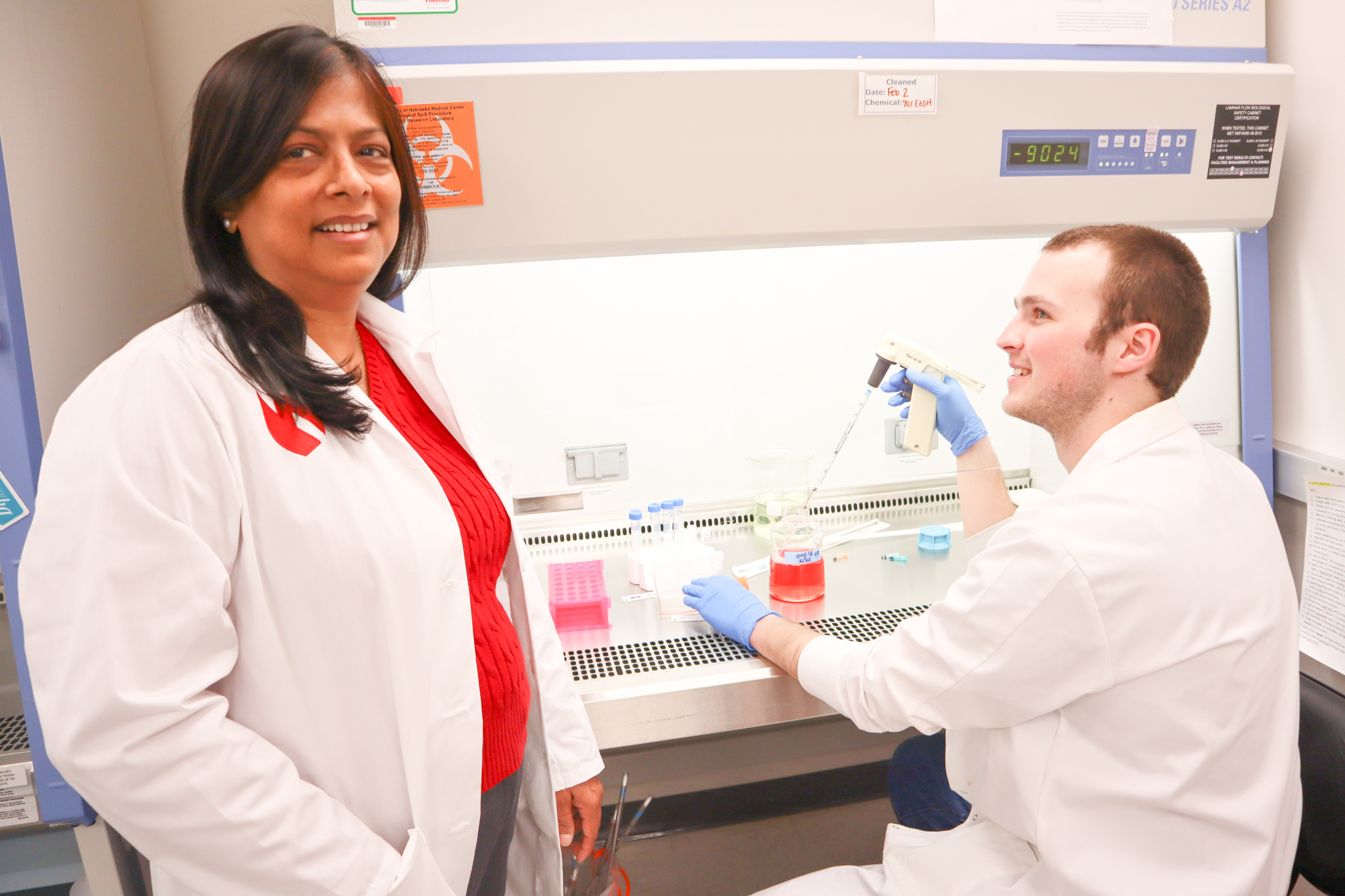Dr. Sutapa Ray Discusses NU Collaborative Initiative Awarded Research Project

Dr. Sutapa Ray Discusses Research Project Funded by the NU Collaborative Initiative
The Nebraska Research Initiative (NRI), which aims to spur innovation across the four campuses of the NU system, recently announced the recipients of grants for the 2022-2023 NU Collaboration Initiative cycle. One of the awardees is CHRI member Sutapa Ray, PhD, assistant professor in the division of Pediatric Hematology and Oncology, who teamed up with Forrest Kievet, PhD, associate professor in the department of Biological Systems Engineering at UNL. Their grant, “Therapeutic efficacy of STAT3 nanoparticle in pediatric brain tumor Medulloblastoma,” will total $150,000 over a two-year period.
Dr. Ray’s lab studies the mechanisms by which activated Signal Transducers and Activators of Transcription 3 (STAT3) regulate the growth of medulloblastoma (MB) tumors, especially in the more severe MYC-driven Grp 3 subgroup of MB. Dr. Kievet uses his expertise in nanotechnology to develop nanoparticles that can transport therapeutic molecules and deliver them to specific target tissues to regulate the disease state. After Dr. Kievet presented his exciting work at a Pediatric Cancer Research Group seminar in Omaha a few years ago, he and Dr. Ray struck up a conversation that led to developing an NIH R21 grant proposal together. When that effort was not successful, they submitted a Collaboration Initiative proposal together at the NU Collaboration Initiative Retreat last November
Recently Dr. Ray’s lab discovered that onco-miR-21, a non-coding microRNA, promotes persistent STAT3 activation by turning off a gene called PIAS3 that would otherwise act as a negative regulator of activated STAT3. She and her team showed that a very specific peptide inhibitor of STAT3 can inhibit miR-21 and reactivate PIAS3 and, thereby, slow the growth of MB cells. Now, with Dr. Kievet and his bioengineering lab at UNL, they are pursuing a new strategy to suppress tumors in the brains of mice, by incorporating STAT3 peptide inhibitor into a novel nanoparticle. Specifically, they will develop a tumor-targeting nanoparticle containing the STAT3 peptide inhibitor and test its therapeutic efficacy in vivo. One of the big hurdles in the treatment of MB is that the blood-brain barrier (BBB) impedes the delivery of many drug compounds to the brain. Dr. Kievit will incorporate the brain-targeting claudin-1 peptide into the nanoparticle to aid its passage through the BBB and delivery into the target organ.
A long-range goal is for the novel nanoparticle to sensitize MB tumors to the chemotherapy drug cisplatin. This could make it possible to decrease chemotherapy dosing while avoiding recurrent tumor formation, improving survival and quality of life for pediatric MB patients. Drs. Ray and Kievet envision that preliminary data from the NRI-funded study will provide a compelling premise for a multi-principal investigator NIH R01 grant that can take the project to the next stage.
Dr. Ray encourages fellow faculty to seize the opportunity to engage in the next Collaboration Initiative annual meeting, which will take place Oct. 6 (participation is a prerequisite to be eligible for these grants).
“Attending the annual meeting retreat and participating in different sessions/group meetings, sharing information and resources, will help to initiate and develop collaboration with faculty at different NU campuses,” she explained. “The retreat is thus very useful for gathering researchers with different expertise, knowledge and perspectives and discovering ways to combine their knowledge and resources to form new ideas that might not have been possible by working alone.”
Congratulations, Dr. Ray!